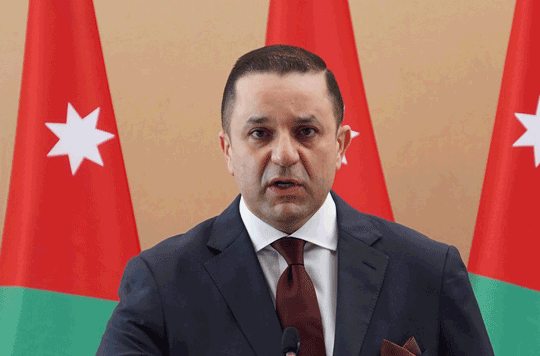You are here
Finance minister unveils 2024 draft budget bill, fiscal plans
By JT - Dec 20,2023 - Last updated at Dec 20,2023

Finance Minister Mohammad Al-Ississ unveils the 2024 draft budget bill before the Lower House on Wednesday (Petra photo)
AMMAN — Finance Minister Mohammad Al-Ississ unveiled on Wednesday the 2024 draft budget bill before the Lower House, describing it as a strategic fiscal plan prepared amidst global economic hardships and regional instability.
The budget, characterised by its “unprecedented” flexibility, aimed to bolster Jordan’s political stance and economic resilience, adding that the budget allocates “historical” highs to security services and the Jordanian Armed Forces-Arab Army (JAF), reflecting the government’s prioritisation of national stability, according to the Jordan News Agency, Petra.
The 2024 budget reflected the government’s plan for enhancing legislative-executive cooperation and receptivity to diversified opinions, particularly in the current juncture of the Arab and Islamic nation’s history. It also marks a significant increase in capital expenditures, reaching the highest value in the history of Jordan’s public budgets. These expenditures are crucial for driving economic growth and modernisation.
Ississ emphasised the budget’s role in stabilising and preventing economic volatility while aligning closely with citizen aspirations, taking into account the backdrop of global economic challenges, including the aftermath of the COVID-19 pandemic, geopolitical strife, particularly the Russian-Ukrainian conflict, and the inflationary trends that have emerged in a global stagflation period.
The budget also stressed Jordan’s Economic Modernisation Vision, with substantial investments allocated to projects that aim to enhance public sector efficiency and stimulate economic activity, with projects in various sectors such as municipal development, de-centralisation, and infrastructure improvements.
He noted that this global economic scene has impelled nations to adopt contractionary policies, prioritising inflation containment over economic recovery, thereby hampering efforts to regain pre-pandemic growth trajectories.
He also pointed out the new agreement with the International Monetary Fund (IMF) on a financial and monetary reform programme worth $1.2 billion, extending to 2028. This programme planned to put public debt on a gradual decline, targeting about 79 per cent of the gross domestic product (GDP) by 2028, while simultaneously aiming to avoid tax increases and enhance capital spending, Petra reported.
Ississ presented a “cautiously optimistic” outlook for Jordan’s economy, noting that the national economy is expected to achieve a growth of 2.6 per cent at fixed prices in 2023, slightly higher from 2.4 per cent in 2022. However, he acknowledged that “this growth rate, while steady, is not sufficient to significantly improve the living standards of Jordanians”.
He provided a future perspective on Jordan’s economic trajectory, saying that “the national economy is expected to continue its recovery, with a projected growth of about 2.6 per cent in 2024”.
Ississ mentioned the challenge posed by the rise in the public debt interest bill that resulted from the US Federal Reserve’s decision to continue raising interest rates until July 2023. He said that “despite these challenges, the government’s approach to managing public debt has been effective”, enabling Jordan to fulfil its internal and external financial obligations without compromising economic performance.
He also cited a World Bank report confirming that food prices in Jordan remained “stable”, with an increase rate not exceeding 1.7 per cent during the first 10 months of 2023.
The government is working towards reducing the unemployment rate, which stood at about 22.3 per cent during the third quarter of 2023, according to Ississ. “The primary path to reducing unemployment lies in restoring growth momentum at higher rates and through financial stability.”
The minister discussed the fiscal policy’s “success” in enhancing the momentum of domestic revenues, which rose about JD584 million, or 7 per cent, from their level in 2022, then highlighted the income tax revenues for 2023 that exceeded the estimate by about JD80 million, driven by the success of tax reforms and measures to combat tax evasion, Petra reported.
He added that tax revenues are expected to rise by about JD673 million, a 10.2 per cent growth, without increasing tax rates, showcasing the effectiveness of the policies and tax administration.
Ississ highlighted that the budget will allocate JD1.729 billion for capital expenditures in 2024, an increase of 11.8 per cent amounting to JD182 million compared to 2023. He also referred to the role of foreign grants in the budget, which represented a significant amount of public revenues and are estimated to be around JD724 million.
Inflation in 2024 is anticipated to remain moderate, not exceeding 2.7 per cent, adding that this is vital for maintaining financial stability and is a key indicator of the government’s success in preventing a loss in citizens’ purchasing power.
The current account deficit was projected to decline to 6.5 per cent of GDP, with improvements in the trade balance, increased remittances from Jordanians working abroad, and a rise in foreign investments.
Later in the day, the Lower House referred the draft budget bill to its Finance Committee for deliberations with ministries and other government departments before reaching recommendations and referring them to the Chamber, Petra added.
Related Articles
AMMAN — The government on Wednesday endorsed the draft general budget law for 2024 with estimated public revenues of JD10.3 billion, marking
AMMAN — The Senate on Tuesday endorsed the 2023 draft state budget as referred from the Lower House.Senators also approved 64 recommendation
AMMAN — Jordan's GDP is projected to grow by 2.7 per cent, as inflation is expected to narrow to 3.8 per cent in 2023, Finance Minister Moha
















